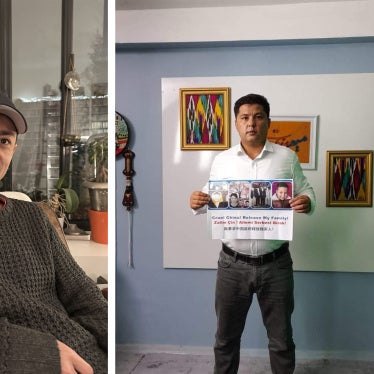(New York) - The Hong Kong government should immediately investigate allegations that police violated participants' rights during the annual Hong Kong protest march on July 1, 2011, Human Rights Watch said today. The police were assigned to keep order at the march and rally, but allegedly violated participants' rights of freedom of expression and association and used disproportionate force against some members of the news media, Human Rights Watch said.
The alleged abuses occurred in the early hours of July 2, after the rally ended as the remaining protesters converged in front of the Bank of China Tower and Cheung Kong Center in central Hong Kong. Police briefly detained Law Yuk Kai, director of Hong Kong Human Rights Monitor, a nongovernmental organization, as he videotaped police officers removing and arresting protesters who were blocking traffic. Police released him shortly afterward, but removing him from the scene prevented him from effectively monitoring the protest.
"The Hong Kong government needs to adopt a zero tolerance policy against the abuse of the freedoms of protesters and journalists who seek only to exercise their legal rights," said Sophie Richardson, Asia advocacy director at Human Rights Watch.
Journalists have alleged that police at the scene unnecessarily used pepper spray against reporters covering the march. The Hong Kong Journalists' Association chairwoman, Mak Yin-ting, complained in a letter sent to Police Commissioner Andy Tsang Wai-hung, news reports said, that police used pepper spray against at least 19 journalists, including three reporters who were sprayed directly in the face and eyes. The journalists' group is demanding a police investigation. "At a time when freedom of speech and assembly and the rights of a free press are under serious attack by Chinese security forces just over the border, it's essential for the Hong Kong government to demonstrate a strong commitment to the defense of those same rights and freedoms in Hong Kong," Richardson said.
The annual march is organized to mark the anniversary of the July 1, 1997 end of British colonial rule and the founding of the Hong Kong Special Administrative Region of the People's Republic of China (HKSAR). The march attracts tens of thousands of demonstrators protesting issues of perceived political, social, and economic injustice in Hong Kong.
The rights of freedom of expression and association and a free press are guaranteed in the Universal Declaration of Human Rights as well as the Constitution of the People's Republic of China. Article 27 of Hong Kong's constitution, the Basic Law, guarantees Hong Kong citizens "freedom of speech, of the press and of publication; freedom of association, of assembly, of procession and of demonstration."
Human rights lawyers and civil society activists in Hong Kong have in recent years expressed increasing concern about a perceived lower official tolerance for dissent in the territory. Such concerns have been exacerbated by Hong Kong immigration authorities' denial of entry to high-profile critics of China's human rights record including the 1989 Tiananmen Square student protest leader Wang Dan. In its most recent annual report, released on July 11, the Hong Kong Journalists Association noted that "The trend for the government, and in particular the police, to take a harsher line against protesters has continued in [2011]."
Human Rights Watch has noted that despite the allegations, the Hong Kong government has not yet spoken out in defense of the rights of the July 1 protesters. Donald Tsang Yam-kuen, the Hong Kong chief executive, has instead so far only praised the police for exercising "a high level of restraint" on July 1 and 2, while criticizing some protesters for "behaving with disregard for the safety of others and the law, causing a disruption of public order."
"If Donald Tsang and the Hong Kong government turn a blind eye to alleged police abuses, they risk Hong Kong's reputation as a bastion for civil liberties," Richardson said.





